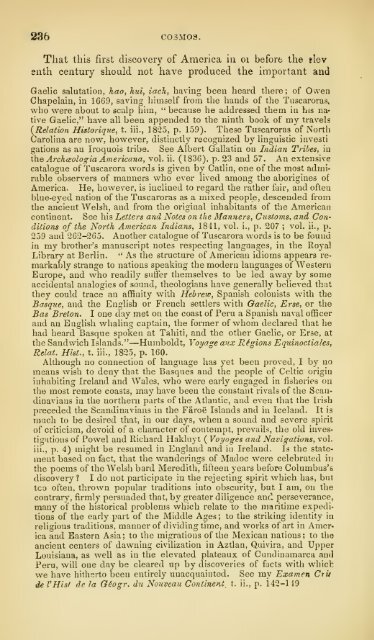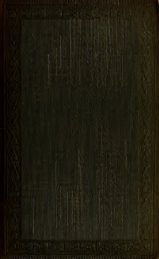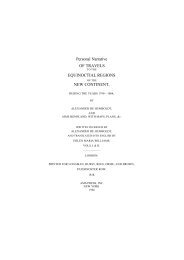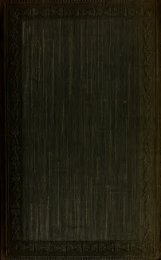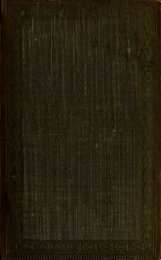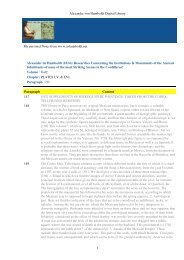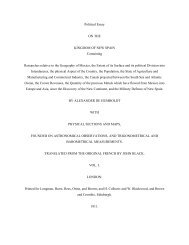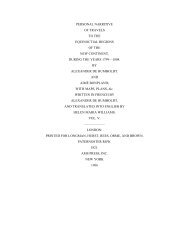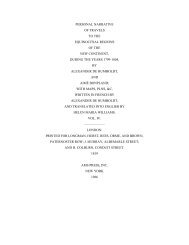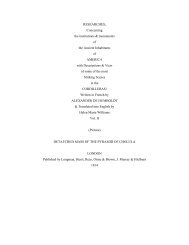See the complete document here
See the complete document here
See the complete document here
You also want an ePaper? Increase the reach of your titles
YUMPU automatically turns print PDFs into web optimized ePapers that Google loves.
236 COSMOS.<br />
That this first discovery of America in oi before <strong>the</strong> elev<br />
snth century should not have produced <strong>the</strong> important and<br />
Gaelic salutation, hao, hxii, inch, having been heard <strong>the</strong>re; of Owen<br />
Chapelain, in 1669, saving himself from <strong>the</strong> hands of <strong>the</strong> Tuscaroras,<br />
who were about to scalp him, " because he addressed <strong>the</strong>m in his native<br />
Gaelic," have all been appended to <strong>the</strong> ninth book of my travels<br />
(Relation Hisiorique, t. iii., 18'25, p. 159). These Tuscaroras of North<br />
Cai'olina are now. however, distinctly recognized by Hnguistic investi<br />
gations as an Iroquois tribe. <strong>See</strong> Albert Gallatin on Indian Tribes, in<br />
<strong>the</strong> Archceologia Americana, vol. ii. (1836), p. 23 and 57. An extensive<br />
catalogue of Tuscarora words is given by Catlin, one of <strong>the</strong> most admirable<br />
observers of manners who ever lived among <strong>the</strong> aborigines of<br />
America. He, however, is inclined to regard <strong>the</strong> I'a<strong>the</strong>r fair, and often<br />
bhie-eyed nation of <strong>the</strong> Tuscaroras as a mixed people, descended from<br />
<strong>the</strong> ancient Welsh, and from <strong>the</strong> original inhabitants of <strong>the</strong> American<br />
continent. <strong>See</strong> his Letters and Notes on <strong>the</strong> Manners, Customs, and Con-<br />
ditions of <strong>the</strong> North American Indians, 1841, vol. i., p. 207 ; vol. ii., p.<br />
259 and 262-265. Ano<strong>the</strong>r catalogue of Tuscarora words is to be found<br />
in my bro<strong>the</strong>r's manuscript notes respecting languages, in <strong>the</strong> Royal<br />
*'<br />
Library at Berlin. As <strong>the</strong> structure of American idioms appears remarkably<br />
strange to nations speaking <strong>the</strong> modern languages of Western<br />
Europe, and who readily suffer tliemselves to be led away by some<br />
accidental analogies of sound, <strong>the</strong>ologians have generally believed that<br />
<strong>the</strong>y could trace an affinity wilii Hebrew, Spanish colonists with <strong>the</strong><br />
Basque, and <strong>the</strong> English or French settlers with Gaelic, Erse, or <strong>the</strong><br />
Bas Breton. I one day met on <strong>the</strong> coast of Peru a Spanisli naval officer<br />
and an English whaling captain, <strong>the</strong> former of whom declared that he<br />
had heard Basque spoken at Tahiti, and <strong>the</strong> o<strong>the</strong>r Gaelic, or Erse, at<br />
<strong>the</strong> Sandwich Islands."— Humboldt, Voyage aux Regions Equinoctiales,<br />
Relat. Hist., t. iii., 1825, p. 160.<br />
Although no connection of language has yet been proved, I by no<br />
means wish to deny that <strong>the</strong> Basques and <strong>the</strong> people of Celtic origin<br />
inhabiting Ireland and Wales, who were early engaged in fisheries on<br />
<strong>the</strong> most remote coasts, may have been <strong>the</strong> constant rivals of <strong>the</strong> Scan-<br />
dinavians in <strong>the</strong> nor<strong>the</strong>rn parts of <strong>the</strong> Atlantic, and even that <strong>the</strong> Irish<br />
preceded <strong>the</strong> Scandinavians in <strong>the</strong> Faroe Islands and in Iceland. It is<br />
much to be desired that, in our days, when a sound and severe spirit<br />
of criticism, devoid of a character of contempt, prevails, <strong>the</strong> old inves-<br />
tigations of Powel and Richard Hakluyt ( Voyoges and Navigations, vol.<br />
iii., p. 4) might be resumed in England and in Ireland. Is <strong>the</strong> statement<br />
based on fact, that <strong>the</strong> wanderings of Madoc were celebrated in<br />
<strong>the</strong> poems of <strong>the</strong> Welsh bard Meredith, fifteen years before Columbus's<br />
discovery? I do not participate in <strong>the</strong> rejecting spirit which has, but<br />
too often, throwrn popular traditions into obscurity, but I am, on <strong>the</strong><br />
contrary, firmly persuaded that, by greater diligence and perseverance,<br />
many of <strong>the</strong> historical problems which relate to <strong>the</strong> maritime expeditions<br />
of <strong>the</strong> early j>art of <strong>the</strong> Middle Ages ; to <strong>the</strong> striking identity in<br />
relisfious traditions, manner of dividing time, and works of art in America<br />
and Eastern Asia; to <strong>the</strong> migrations of <strong>the</strong> Mexican nations; to <strong>the</strong><br />
ancient centers of dawning civilization in Aztlan, Quivira, and Upper<br />
Louisiana, as well as in <strong>the</strong> elevated plateaux of Cundinamarca and<br />
Peru, will one day be cleared up by discoveries of facts with which<br />
we have hi<strong>the</strong>rto been entirely unacquainted. <strong>See</strong> my Examen Crit<br />
de VHisf de la Giogr. du Nouveau Continent, X. ii., p. 142-U9


